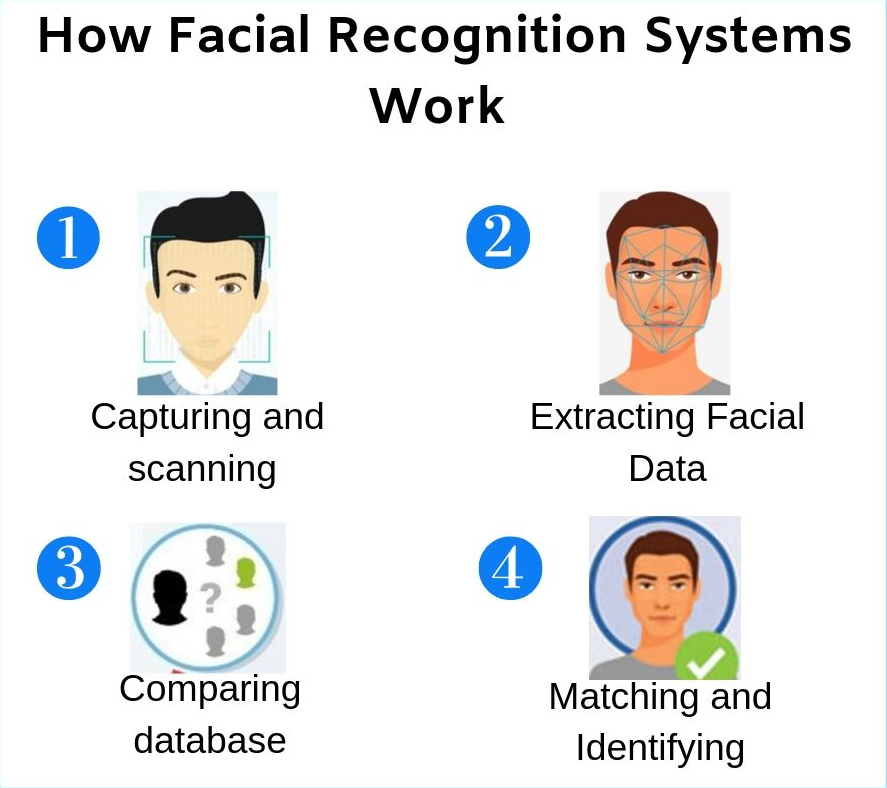Science & Technology
Facial Recognition Technology
- 06 Dec 2021
- 5 min read
Why in News
After a delay of three years, passengers will be able to use a face scan as their boarding pass at four airports (Varanasi, Pune, Kolkata and Vijayawada) in the country from 2022.
Key Points
- Facial Recognition:
- It is a biometric technology that uses distinctive features of the face to identify and distinguish an individual.
- Over a period of almost 6 decades, it has evolved in many ways- from looking at 3D contours of a face to recognizing skin patterns.
- In the Automated Facial Recognition System (AFRS), the large database (containing photos and videos of peoples’ faces) is used to match and identify the person.
- Image of an unidentified person, taken from CCTV footage, is compared to the existing database using Artificial Intelligence technology, for pattern-finding and matching.
- It is a biometric technology that uses distinctive features of the face to identify and distinguish an individual.
- Working:
- The facial recognition system works primarily by capturing the face & its features through the camera and then using various kinds of software to reconstruct those features.
- The captured face along with its features is stored into a database, which can be integrated with any kind of software that may be used for security purposes, banking services, etc.
- Need:
- Authentication:
- It is used for identification and authentication purposes with a success rate of almost 75%.
- Force Multiplier:
- In India, where there are just 144 constables per 1 lakh citizens, this can act as a force multiplier. It neither requires too much manpower nor regular upgradation.
- Hence, this technology coupled with the present manpower in place can act as a game-changer.
- Authentication:
- Challenges:
- Infrastructural Costs:
- Technologies like Artificial Intelligence and Big Data are costly to implement.
- The size of stored information is extremely large and requires huge network & data storage facilities, which are currently not available in India.
- Violation to Privacy:
- Government although plans to address the question of privacy through the legal framework like data privacy regime, but keeping in mind the objectives it aims to achieve with the use of such technology, it comes into conflict with one another.
- Reliability & Authenticity:
- As the data collected may be used in the court of law during the course of a criminal trial, the reliability and the admissibility of the data along with standards and procedure followed would be taken into consideration.
- Absence of Data Protection Law:
- FRT systems in the absence of data protection laws that would mandate necessary safeguards in the collection and storage of user data is also a point of concern.
- Inherent Challenges:
- Over time, the face may have different-different facets is also a point of concern.
- Infrastructural Costs:
Way Forward
- In this digital age, data is a valuable resource that should not be left unregulated. In this context, the time is ripe for India to have a robust data protection regime.
- It is time that requisite changes are made in the Personal Data Protection Bill, 2019. It needs to be reformulated to ensure that it focuses on user rights with an emphasis on user privacy. A privacy commission would have to be established to enforce these rights.
- The government would also have to respect the privacy of the citizens while strengthening the right to information. Additionally, the technological leaps made in the last two to three years also need to be addressed knowing that they have the capacity of making the law redundant.







